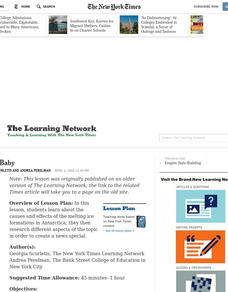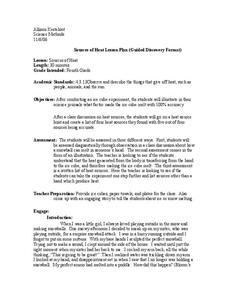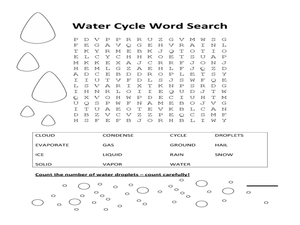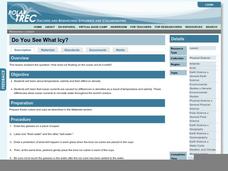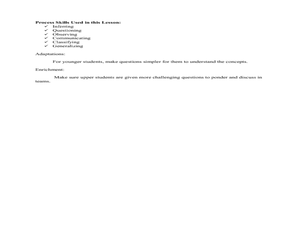Curated OER
Scientific Method Experiment: Factors Affecting How Ice Melts
Students demonstrate the scientific method by conducting an ice cube melting experiment. They make predictions and observations, and conclude what factors make ice melt more slowly or quickly than normal.
Captain Planet Foundation
Solar Cooking Race
Study heat transfer with activities that focus on how heat energy works. Using a solar cooker, ice cubes, and heat transfer bracelets, kids experiment and record what they find by keeping ice cubes cold and vegetables hot.
California Academy of Science
Global Climate Change and Sea Level Rise
Ice is nice, and its condition on the planet has a significant effect. Junior geoscientists experiment with ice melting in both water and on land to discover how each affect the rising sea level. This detailed instructional activity...
Curated OER
Ice
Students examine the different propereties of ice, such as freezing temperature. In this scientific lesson students complete several activities using ice, like making ice cream.
Teach Engineering
Insulation Materials Investigation
Don't melt away! Pairs investigate different insulation materials to determine which one is better than the others. Using a low-temp heat plate, the teams insulate an ice cube from the heat source with a variety of substances. They...
Curated OER
Ice, Ice, Baby
Young scholars explore the causes and effects of the melting ice formations in Antarctica; they then research different aspects of the topic in order to create a news special.
Curated OER
Ice Cream: a Taste of Science!!
Learners define the term solution. They explain conservation of energy and energy transfer as it relate to how the milk solution became ice cream. Students are able to explain freezing point depression.
Curated OER
Water Cycle Stories
Learners explore the water cycle and associated phase changes. They predict what happens to the mass of an ice cube in a Ziploc bag, discuss and act out phase changes and diagram the water cycle.
Virginia Department of Education
The Law of Conservation of Matter
The Law of Conservation of Matter can be complex for young scientists to fully grasp. Use this experiment to help simplify the process as pupils perform two experiments to determine mass: one that melts a substance and the other that...
Curated OER
Sources of Heat
Fourth graders conduct an experiment related to heat sources, and participate in a heat source hunt. They identify sources of heat, then compare the melting rate of ice cubes, illustrating the results in their science journal. Students...
Virginia Department of Education
Molar Heat of Fusion for Water
How can you describe heat of fusion in a way the class understands and relates the importance of this concept to present day issues? In this third lesson of the series, learners conduct an experiment, demonstrating the flow of heat...
Curated OER
Water and Ice
Students perform experiments in pairs to visualize the changes in water during freezing and melting. In this properties of water lesson, students use their senses and inquiry tools to understand the changes in state of water. Suggested...
Curated OER
The Great Melting Race
Students show their knowledge by choosing the correct answer about solids, liquids and gases. Students also write short answer responses to questions about experiments they have done.
Curated OER
More on Conduction and Convection
Why do some items feel colder when they are the same temperature? How should you keep your soda cold? What makes the wind blow? These are just some of the things middle schoolers discover when completing a lesson plan on conduction and...
Curated OER
Ice Breakers
Middle schoolers understand the effects of global warming on icecaps. They investigate the worldwide consequences that may result.
Curated OER
Understanding Oceans
Students investigate how ocean currents affect our world. For this ocean currents lesson, students perform an experiment to show how cold water is near the poles and warm water is near the equator. Students use water, food coloring, ice...
Curated OER
Observing Reactions
Students use the scientific method to complete to experiments that have visible reactions. In this visible reaction lesson, students participate in an experiment with melting ice and one with inflating a balloon. Students record their...
Polar Trec
Do You See What Icy?
Here is a lesson that kicks off with a question. "How does ice floating on the ocean act as it melts?" As learners investigate this natural phenomenon, they'll discover that it has a lot to do with temperature, salinity, and the effect...
Polar Trec
Is There Salt in a Glacier?
What can conductivity tell us about a glacier? Groups analyze glacial melt to determine salt content through an analysis of the pH and conductivity measurements of two samples. Groups then determine the source of the salts.
Curated OER
Heat Energy
Students study how matter changes from solids to liquids or liquids to solids. In this physical science lesson, students discuss heat energy and experiment with heat by changing a candle into a liquid using a hot plate.
Curated OER
Hot Air Balloons
Students examine how a hot air balloon works. In this hot air balloon activity, students do an experiment to test the effects of heat on density. Students make their own hot air balloon and act out how nitrogen moves when turned to a...
Curated OER
Thermal Expansion
Learners examine how thermal expansion of water can affect sea level. They conduct an experiment that demonstrates what happens to water levels when exposed to heat, record the results on a data sheet, and discuss the results.
Center for Learning in Action
Water – Changing States (Part 2)
Here is part two of a two-part lesson in which scholars investigate the changing states of water—liquid, solid, and gas—and how energy from heat changes its molecules. With grand conversation, two demonstrations, and one hands-on...
Curated OER
Sand & Water: Arctic in the Sun
Students chill out on a hot day with this outdoor activity. In this early childhood physical education lesson, students have fun experimenting through play with ice and toy animals in water.







